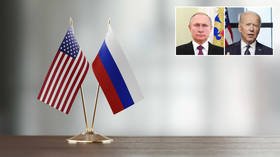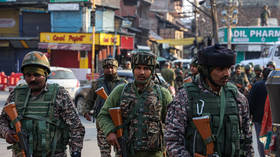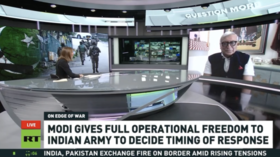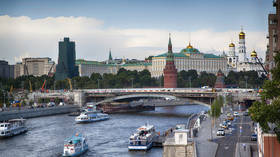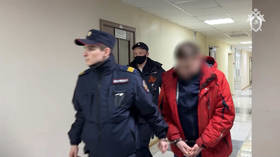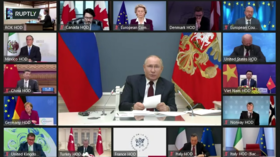Crisis in American expertise: Washington has a dangerous & destructive pattern of willful ignorance on Russia in post-Soviet era
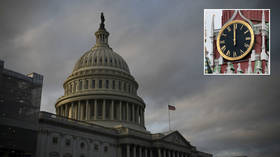
The rejection of Matthew Rojansky’s candidacy as a Russia adviser to Joe Biden represents an escalation, and not a departure, from a pervasive bipartisan American pattern of dangerous ignorance about Russia in the post-Soviet era.
It was reported last week that Joe Biden’s government would not be hiring Rojansky, of the Kennan Institute think tank, to help form policy towards Russia. Though the analyst is known as a moderate realist regarding Russia issues – in other words, he is not a virulent anti-Moscow ideologue – he was considered too controversial to be allowed a hearing during White House deliberations on policy regarding the world’s largest country.
Rojansky’s sin? Unlike many of the current crop of foreign policy officials, he actually has some expertise and experience on the subject.
While the scholar’s fate may be a glaring and extreme example of an anti-Russia mindset in Washington that is counterproductive, it represents only a new low, and not a change from a pervasive bipartisan pattern in the post-Soviet era.
Also on rt.com US imposes new sanctions against Russia, expels ten diplomats & targets national debt in move Moscow may view as major escalationThose who aspire to, or attain, the most powerful executive position in the United States have shown a disturbingly willful ignorance of Russia. I learned from a former State Department official that, in response to a renowned Russia expert attempting to brief presidential candidate Bernie Sanders in 2016, the self-described democratic socialist “showed little interest or knowledge about US-Russia relations and the attendant dangers of a new cold war.”
Instead, Sanders was ultimately content to mimic the juvenile and Manichean “democracies versus authoritarians” model of international relations.
Similarly, an American business executive told me that, during a lunch with him and other leaders of commerce at the US Embassy in Moscow in 2012, then-Vice President Joe Biden showed no interest in his interlocutors’ suggestions that it was in the US’ best interests to partner with Russia after they offered social, economic, and strategic justifications for their view.
Also on rt.com Russia is seeking ‘pragmatic cooperation’ with US, not outright conflict, America’s own national intelligence director claimsBiden seemed to see the meeting as an opportunity to lecture on his position rather than to learn or seek insight on Russia.
Moreover, once a US president is in power, the advisers that are appointed to counsel the commander in chief about Russia have been less than impressive from the 1990s onward. Condoleezza Rice served as an expert in the George Bush Senior administration and was wrong about the impending collapse of the Soviet Union. During her stint as secretary of state in the second term of the junior Bush administration, her Russian counterparts who spent significant time with her made the observation that Rice was “a Soviet expert, and not a Russia expert.”
There was little improvement in the Obama era, as mediocre academics like Celeste Wallander were given positions on the National Security Council, and an ideologue like Michael McFaul was bizarrely appointed as ambassador.
According to investigative journalist Gareth Porter, advisers to Obama were so utterly incompetent that those serving in the administration really didn’t think Russia had the ability or inclination to counter Washington’s provocative actions in Syria, and therefore they did not plan for that possibility. This incompetence was also highlighted by Obama’s public comments to the Economist in 2014, in which he claimed that Russia didn’t make anything, immigrants didn’t go there, and male life expectancy was 60 years – three claims that anyone with actual expertise on Russia should have easily known were false.
In fact, at that point, Russia was the second most popular migration destination in the world, after America itself, while average lifespans have been converging with those of the US over the past decade. As for manufacturing, Obama said these words at a time when the US, for instance, was totally reliant on Russian rockets for access to space, having retired its own unreliable Space Shuttle fleet. If he had access to a competent adviser on the subject, would he have made these mistakes?
Under Biden – who caved to pressure from the foreign policy blob to not appoint Rojansky – the advisers who are in place or in line, including Jake Sullivan, Antony Blinken, Madeleine Albright/Hillary Clinton adviser Wendy Sherman, the German Marshall Fund’s Karen Donfried, and State Department nominee Victoria Nuland represent more of the same dangerous ineptitude and strident thinking. Many of these advisers, like their predecessors, have little on-the-ground experience with contemporary Russia.
Also on rt.com Washington rejected Moscow’s offer of complete reset in Russia-US relations shortly after inauguration of Biden, FM Lavrov revealsNeoconservative ideologue Nuland, of course, is a slightly different case in that she has put her boots on the ground in the region. Unfortunately, that experience includes facilitating the dangerously divisive 2014 coup in Ukraine, without which Crimea would still be in Ukraine and the Donbass would be at peace. Competent officials would have warned Obama and Biden that the Maidan would lead to consequences like these.
It takes a special kind of hubris for the US political class to keep thinking they can get away with this level of sloppiness in understanding the world’s other nuclear superpower – a country so massive that it straddles two major continents and is the sixth largest economy in terms of purchasing power parity – without serious consequences. At what point will God’s providence run out?
The statements, views and opinions expressed in this column are solely those of the author and do not necessarily represent those of RT.
If you like this story, share it with a friend!
The statements, views and opinions expressed in this column are solely those of the author and do not necessarily represent those of RT.
